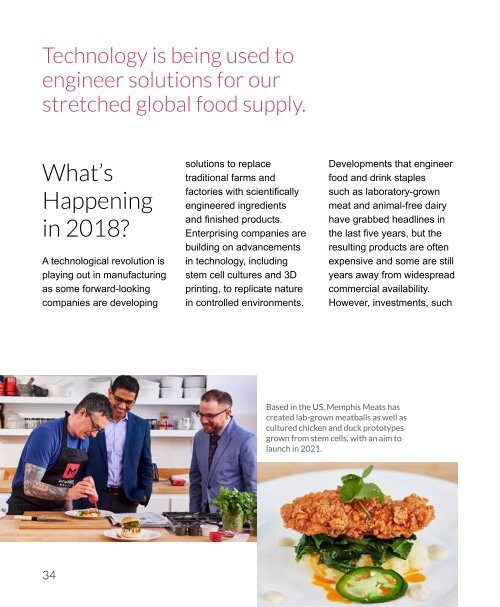mintel-food-and-drink-trends-2018
Create successful ePaper yourself
Turn your PDF publications into a flip-book with our unique Google optimized e-Paper software.
Technology is being used to<br />
engineer solutions for our<br />
stretched global <strong>food</strong> supply.<br />
What’s<br />
Happening<br />
in <strong>2018</strong>?<br />
A technological revolution is<br />
playing out in manufacturing<br />
as some forward-looking<br />
companies are developing<br />
solutions to replace<br />
traditional farms <strong>and</strong><br />
factories with scientifically<br />
engineered ingredients<br />
<strong>and</strong> finished products.<br />
Enterprising companies are<br />
building on advancements<br />
in technology, including<br />
stem cell cultures <strong>and</strong> 3D<br />
printing, to replicate nature<br />
in controlled environments.<br />
Developments that engineer<br />
<strong>food</strong> <strong>and</strong> <strong>drink</strong> staples<br />
such as laboratory-grown<br />
meat <strong>and</strong> animal-free dairy<br />
have grabbed headlines in<br />
the last five years, but the<br />
resulting products are often<br />
expensive <strong>and</strong> some are still<br />
years away from widespread<br />
commercial availability.<br />
However, investments, such<br />
as those made by General<br />
Mills, Tyson, Cargill, Unilever,<br />
<strong>and</strong> tech billionaire Bill<br />
Gates, have hastened the<br />
pace of development <strong>and</strong><br />
availability of scientifically<br />
engineered <strong>food</strong> <strong>and</strong> <strong>drink</strong>.<br />
In 2017, 26% of Spanish,<br />
13% of Polish, 11%<br />
of French, 9% of<br />
Italian, <strong>and</strong> 8% of<br />
German consumers<br />
aged 16+ agree that<br />
lab-grown, cultured,<br />
or synthetic meat<br />
appeals to them.<br />
Pioneering products<br />
may encourage<br />
consumers to think differently<br />
about how scientifically<br />
engineered products could<br />
benefit the traditional <strong>food</strong><br />
<strong>and</strong> <strong>drink</strong> supply, especially<br />
the potential to alleviate<br />
some of the pressure that our<br />
global <strong>food</strong> supply is under.<br />
Forward-looking companies<br />
are raising awareness by<br />
putting their products into<br />
perspective compared with<br />
the traditional <strong>food</strong> <strong>and</strong> <strong>drink</strong><br />
supply chain. US company<br />
Beyond Meat’s prepared meal is made with plant-based chicken<br />
<strong>and</strong> states that when buying the product, the consumer is said<br />
to be “lending Mother Nature a helping h<strong>and</strong> <strong>and</strong> positively<br />
impacting climate change by conserving water, energy, <strong>and</strong> l<strong>and</strong>.<br />
European consumers find lab-grown,<br />
cultured, or synthetic meat appealing<br />
26%<br />
Based in the US, Memphis Meats has<br />
created lab-grown meatballs as well as<br />
cultured chicken <strong>and</strong> duck prototypes<br />
grown from stem cells, with an aim to<br />
launch in 2021.<br />
8%<br />
9%<br />
11%<br />
13%<br />
GERMANY<br />
ITALY<br />
FRANCE<br />
POLAND<br />
SPAIN<br />
Base: 2,000 internet users aged 16+<br />
Source: Mintel Reports 2017<br />
34<br />
35



